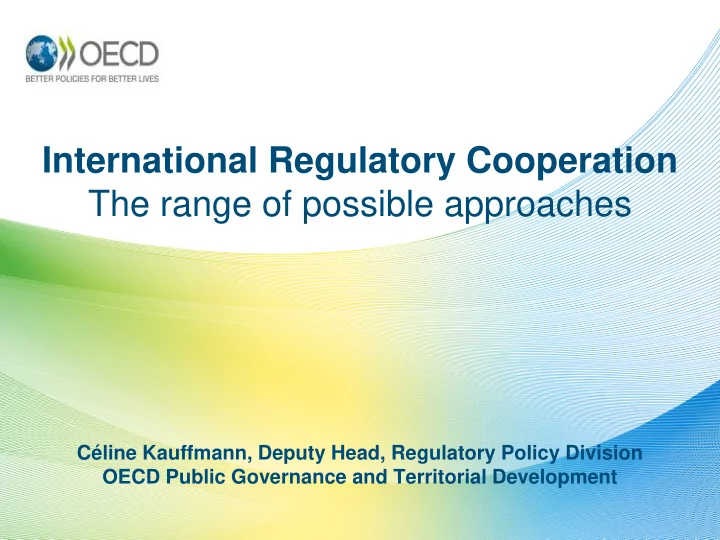

International Regulatory Cooperation The range of possible approaches Céline Kauffmann, Deputy Head, Regulatory Policy Division OECD Public Governance and Territorial Development
Key questions 1. What do we know of the various approaches and instruments of IRC? 2. What are the lessons learnt from the use of different IRC approaches in different country and sector contexts? 3. What are the conditions of success and effectiveness of different IRC approaches?
The ladder of IRC approaches Harmonisation through supra- national institutions Specific negotiated agreements (conventions, treaties) Formal regulatory co-operation partnerships Joint standard setting through IGO Trade agreements with regul. provisions Mutual recognition IRC requirement when drafting regulation, GRP Recognition of international standards Trans-governmental networks of regulators Soft law, guidelines, principles, codes of conduct Regulatory dialogues, exchange of information Source: OECD (2013), International Regulatory Co-operation: Addressing Global Challenges
Lessons learnt on merits / challenges Merits Challenges Type of mechanism The rules are the same for all. Long process. Compliance is the greatest. Integration / Costs of structure & enforcement. harmonisation Less likely to regulatory capture than Sovereignty & legitimacy issues. networks Regulatory High-level leadership Impact on regulators & levels of jurisdiction? partnerships Flexible & continuous mechanism between countries Progress may be slow to materialise Promote continuous dialogue & anticipate IGOs emerging issues. Weaknesses in enforcement and compliance. Regional agreements Multiplicity of provisions Legal force and direct connection to trade with regulatory and economic integration. Impact on regulators? provisions Lack of enforcement in some cases Area-specific legally Legal force binding agreements Lack of flexibility to adapt to changes Time-consuming, costly Preserve State sovereignty Extensive trust MR Reduce duplication efforts & time to market Adaption with changes in regulations? Lack of enforcement Low-cost, flexible and adaptable Soft law / exchange of practices Foster experimentation & innovation Transgovernmental Limited enforcement and monitoring networks Support trust building, technical approaches Exclusion issues? Legitimacy of decisions? & may help avoid race to the bottom
Mutual Recognition: spectrum of modalities Mutual recognition of rules : equivalent Mutual recognition of conformity assessment objectives, regulatory requirements, standards, (procedures / results) for goods under different partner’ rules and conformity assessment procedures The Trans- MRAs The EU principle Stand-alone Tasman incorporated in of MR as a MRAs Mutual RTAs corollary of the Recognition ‘free movement of Agreement goods’ in the non- harmonised Government sectors MRAs Non- Government MLAs (between CABs or Bilateral MRAs Accreditation Multilateral Bodies) MRAs (legally non-binding) Traditional MRAs (without Enhanced Agreements on equivalence of MRAs Conformity regulatory (equivalence Assessment and requirements) of regulatory Acceptance of requirements) Industrial Products (ACAAs) Source: GOV/RPC(2014)12/REV1
MRAs: benefits, costs & success factors • (Small) positive impact on trade • Avoid duplication of test, uncertainty on Benefits rejection & shorten ‘time -to- market’ • Knowledge flows & peer learning • Seen as costly by regulators /admin Costs • Challenging political economy & implementation • Science-driven domains Success • Big global value chains factors • Regulatory divergence is not too high • Confidence / institutional proximity
THANK YOU Contacts: Celine.kauffmann@oecd.org IRC website: www.oecd.org/gov/regulatory-policy/irc.htm Recommendation of the Council on Regulatory Policy and Governance : www.oecd.org/gov/regulatory-policy/2012-recommendation.htm OECD (2015), Regulatory Policy Outlook , OECD Publishing, Paris: www.oecd.org/gov/regulatory-policy/Coming-soon-OECD-Regulatory- Policy-Outlook-2015.htm
Recommend
More recommend